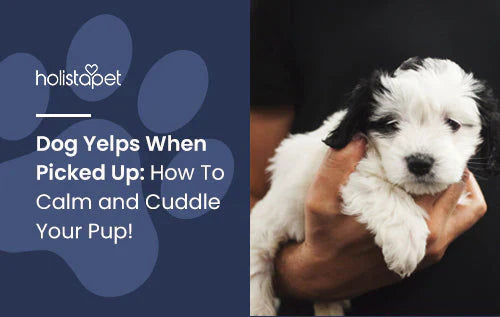If your dog won't sleep at night, odds are you aren't getting much shut-eye, either. When those paws come scratching at your door, or that cold nose nudges your toes in the early hours of the morning, you may wonder if there's a solution. Fortunately, there are plenty of options to get your pooch back to sleep. There can be many reasons why your dog isn't getting a good night's sleep, and this guide will help you find an answer. We've also included solutions to sleep problems so that your furry friend (and you) can rest easy.
Reasons Your Dog Won't Sleep at Night
If your dog is restless at night, it could be due to several factors. Pain, separation anxiety, unfamiliar surroundings, or other symptoms of stress are common reasons for sleeplessness. Identifying the cause of your dog's restlessness is essential to help them return to a peaceful night's sleep.
Related post: How much sleep do dogs need?
The Dog is in Pain
Dogs that have trouble sleeping could be in pain. A health issue could be distracting your dog from a good night's sleep, but it also might be physically painful for it to lie down. Gastrointestinal troubles don't always show themselves as easily as joint pain, so keep an eye out for health problems.
Regular trips to the vet are one of the best ways to spot any issues in your dog. Stiff legs are an easy-to-spot symptom of pain, but other issues might be harder to detect. Signs that require further attention include whining, panting, self-harm (by licking or biting), and pacing at night. Medicine, surgery, or massaging the dog before bed can help, though the treatment your pet needs depends on the kind of problem they're experiencing.
Stress or Anxiety is Preventing Sleep
Dogs can get anxious about the same things humans do. Strange sounds, unfamiliar people, and new settings can all cause stress in our furry friends. Your dog could also be going through a period of depression, causing them to feel anxious every time it tries to go to bed. Some other common causes of stress and anxiety in dogs include:
- Separation
- Aging
- Lack of exercise
- Social fear
- Move to a new home
Social fears can be a problem for dogs who have not been properly socialized. Socialization training involves exposing an animal to potentially stressful situations to show it that there is nothing to fear. If you recently introduced another dog into your home, the new animal might make it anxious.

You can try to prevent some of these stress-inducing situations by allowing your dog to mingle with other animals and people regularly. This helps with separation anxiety, exercise, and socialization. Plus, it desensitizes your dog to new smells, sounds, animals, and people. However, make sure you don't take your pet to a dog park until you believe it is ready to do so. A dog that isn't ready for such a high level of mental stimulation may only become more withdrawn. If you're unsure whether your furry friend is ready, ask a behavioral specialist or vet.
Being Separated from the Pack
Separation can be stress-inducing, but even a pet that is well-socialized could still be restless at night. A dog may be staying up past its bedtime because it is waiting for its owner, sibling, or fellow household pet to come home. This could either be a problem of anxiety or over-excitement.
Pets with separation anxiety feel less capable of functioning without their owner, friend, pet parents or sibling. Dogs that don't feel this way could still be loyally waiting up until their friend comes home. For example, if a pup is fresh from the kennel, it might have trouble sleeping at night because it is waiting to go back "home" and see its familiar pack members and environment. The dog needs to get to know its new environment so that it can go to sleep feeling at home.
New Environment
If you recently moved, or you just brought a new dog home, it's going to take some time for them to warm up to their new bedroom. They likely are not going to feel safe and secure right away since they aren't familiar with all the new scents, sounds, and people in the new place. This insecurity can cause insomnia.
If you're traveling with your dog and they won't sleep, they may not be satisfied with their surroundings. A dog's environment is a big part of its sense of security, so it may help if you bring their bed on overnight trips. It's not always possible to take your dog's bed with you, especially if you have a large breed like a Rottweiler. In this case, you'll want to give your furry friend an object that it can bond with and feel safe around. Toys, blankets, and pillows are inexpensive and portable objects that can act as a little piece of home.
Age
From the youthful energy of a puppy to the cognitive dysfunction that may affect an old dog, an animal's age can greatly affect its sleep patterns. If you can't find any health problems with your dog, ask a vet if the issue is age-related. A condition like canine cognitive dysfunction could be hard to spot. Canine cognitive dysfunction (CCD) is a condition related to old age that causes a dog to wake repeatedly throughout the night.

Research has shown that CCD can show itself in many different ways, with common symptoms including vision impairment, a poor sense of smell, shaking, swaying, or falling. On the flip side, young dogs may also have trouble sleeping since they are energetic at night. The early years of a dog's life are a crucial time for understanding its environment and family. A puppy may also whine for its mother or get nightmares due to its unfamiliar surroundings.
They Need To Relieve Themselves
An unfamiliar setting might cause your pooch to lose sleep at night... or it could be their bladder. Dogs that know they aren't supposed to relieve themselves in the house could try to hold it until they get to go outside. This can result in the dog staying up all night or having an accident. Puppies especially need to know then the appropriate times for bathroom breaks are.
Set a strict potty schedule that works for your routine so your dog can learn to hold it until the next break. Dogs that take several bathroom trips in a short time frame could be experiencing an illness. Try to let a restless pup outside after you determine there are no health concerns. The middle of the night is not an ideal time for a potty break, but it could help your dog fall back to sleep afterward. Further on in this article, we'll go over ways you can reduce those midnight bathroom runs.
Outside Stimulation
Like us, noises and other external stimuli could be keeping your dog up. Dogs prefer to see the source of any noises around them. Since there are typically fewer loud noises during the night (though this is different for everyone), a dog may be woken from sleep to investigate a mysterious sound.
Well, maybe the sound isn't a mystery — it's just the neighbor's cat running around outside. Your pooch needs to know that 1 AM is no time to play. This is where good training comes in handy. White noise machines can also help a dog with anxiety by providing a sort of audible socialization training. Similar to how socialization desensitizes dogs to new experiences, white or pink noise machines can acclimate your pet to various sounds.
Is Sleep Important for Dogs?
A rejuvenating night of sleep is essential for dogs. Puppies, old-timers, and canines in the prime of their life all require healthy, restful sleep. Sleep assists a dog's brain development, memory, learning capacity, and immune system. Studies have shown that sleep-deprived animals are more prone to infections.
Sleep itself is important, but the amount of slumber your pet needs is even more crucial. The amount of sleep your dog needs may be different than your own schedule. If you have other dogs, they could each require varying hours of rest. Factors like age, health, and activity level all affect a canine's sleep needs. Dogs usually sleep 9-14 hours a day, but if you have older dogs or a puppy, you'll want to allow them 18-20 hours of rest. Likewise, a working Border Collie needs more time to replenish its energy reserves than a lap dog.

How to Help Your Dog Sleep at Night
As we've seen, there are many different reasons that you're furry friend is staying up at night. Luckily, there are even more potential solutions to help dogs get some shut-eye. From a cozy dog bed, to natural sleep and relaxation aids like cannabidiol, we've gathered all the top tips for healthy sleep.
It's important to determine the cause of your dog's restlessness. You must also keep their individual quirks in mind. While crate training is effective for most pets, it would not be suitable for dogs with PTSD involving small spaces. Similarly, an old pooch may not receive the same benefits from a dog park trip that a younger pup would. Once you're sure of your dog's underlying conditions, try these methods for getting your canine to get more sleep. Use one technique, or test out a few!
Provide a Peaceful Sleeping Environment
Where your dog sleeps is one of the biggest factors in the quality of its rest. To make sure your furry friend is comfortable when it lays down at night, minimize anything that could distract or startle it. If outside commotion is the main problem, put a white noise machine in the room to cover other sounds.
There is no single "best place" for a dog to sleep, but wherever it lays its head down should be dark, cushioned, and as quiet as possible. Canines occasionally wake and pace, which is normal behavior, but it may keep you awake. Whichever area you choose for your dog's bed, it should be peaceful for you, too.
For a puppy that may not be used to the new sights of its environment yet, it should have a spot that it feels comfortable and familiar. When bringing your pup home for the first time, establish an area that is only for the dog right away. If your dog is waiting for someone to walk through the door that you know won't be coming home that night, try to ease the dog to bed. Let it focus on your presence and comfort until it stops focusing on the individual that isn't home. The dog may feel more comfortable sleeping in your room or bed.

Consider Crate Training
If your dog's size and the situation allows, get a crate for your furry friend. The wolf-like ancestors of modern, domesticated dogs felt most secure in a den. A crate is a great substitute for a den because your dog can feel cozy, recognize the smell, and get to sleep knowing that it's safe.
A crate is a great bonding experience for a puppy. A living space made for a human is large and full of unfamiliar sights and sounds. It can take a while for a pup to get used to all of that, but an animal can get used to a dog-sized crate much more easily and quickly. To crate train your pet, place its bed inside and let the dog spend the night in it. When you leave, keep the dog in its crate so that it feels safe. Eventually, it will associate the space with its own smell, and your dog's sleep schedule may be saved!
Try Adding CBD to their Diet For Better Sleep
A secure and peaceful environment can help some stressed or anxious dogs feel relaxed, but what if your furry friend is still feeling restless? Cannabidiol (CBD) has been recognized among people for its natural, soothing properties, and it can also aid our pets. CBD oil for dogs can dull discomfort associated with old age, ease the tension caused by health issues, relax a dog's fearful tendencies, and promote deep sleep.
Cannabidiol does this by interacting with the endocannabinoid system (ECS) that is present in all mammals. A healthy ECS goes hand-in-hand with a good night's quality sleep too. Keep some CBD nearby if your dog needs help going to sleep at night. Many dogs are frightened by the loud noises of fireworks, so if it's July 4th, you could give your pooch some CBD dog treats or oil before bedtime to relax it.
Exercise Your Dog During the Day
Pent-up energy can make anyone feel jittery, including dogs. Provide your pet with plenty of exercise during the day so that when night comes, they're not only ready for bed but eager for it! A walk around the neighborhood is an easy way to get your furry friend moving. Trips to the dog park are another good option, and they give the animal a chance to relieve itself. Ask your vet how much of a workout your dog needs so that you can give your furry friend enough exercise.
Limit Water Before Bed
Keep an eye on how much water your pooch drinks before bedtime. All dogs should have regular access to clean water to maintain their health, but you can condition your pet to get its fluids earlier in the day. This will ensure that it goes to the bathroom before you turn off the lights and hit the hay.
Give your dog unlimited access to water throughout the day, but limit this amount at night. Take away the food and water bowls two to three hours before sleeping. This will establish a dietary schedule as well as reinforce a sleeping pattern. Excessive thirst at night could be symptomatic of an illness like diabetes or Cushing's disease. If your dog scratches at its water bowl or wakes you up after its had plenty of water during the day, you may need to consult with a vet.
Provide a Comfortable Sleeping Area
Since some breeds are prone to arthritis or slipping kneecaps, your pet's bed can make a significant difference in their sleep schedule. Make sure its bed is well-padded and an appropriate size for the breed. Some canines prefer sleeping on the floor, but every dog should have a bed as an option. Old dogs especially need cushioned support when they lay down. A toy, pillow, or blanket that it can take to bed may help the older dog sleep. Routine is important for canines, so whatever room you choose for them to sleep in, try to keep it consistent.
Find Other Useful Tips About Caring for Dogs Here
Final Thoughts - Dog Won't Sleep at Night
We want a good night's slumber for our dogs, but we also need our standard eight hours. If your pet repeatedly scratches, whines, barks, or licks your face while you sleep, it's time to find a solution. When you and your pooch are both well-rested, there is a reduced risk of infection and fatigue.
To help your dog sleep, pay attention to your furry friend's behavior when it gets restless. Its actions can clue you into what the animal needs to fall back asleep. With options like CBD dog treats and white noise machines, you and your pooch will be snoozing through the night in no time!







![Probiotics For Dogs [Soft Chews] - HolistaPet](http://www.holistapet.com/cdn/shop/files/Probiotic-Infographic-1_472d7a29-e30c-435a-9638-1365d8c3a9f9.jpg?v=1725384841&width=104)




























Leave a comment
All comments are moderated before being published.
This site is protected by hCaptcha and the hCaptcha Privacy Policy and Terms of Service apply.